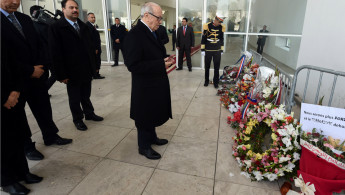Tunisian prime minister fires security chiefs after attack
Tunisian Prime Minister Habib Essid fired six police commanders on Monday, including the head of tourist security, following last week's attack on tourists in Tunisia, the deadliest in 13 years.
Gunmen killed 20 foreign tourists last Wednesday as they got off buses at the Bardo Museum.
"Two gunmen were killed, but there is one who is now on the run," Tunisian President, Beji Caid Essebsi said. Officials are on the hunt for the third suspect.
Essid's decision was made after he visited the neighbourhood of the attack and noted security problems, criticising failings around last week's attack.
Officials have admitted that guards tasked with protecting the museum and the nearby parliament were having coffee at the time of the assault.
Essebsi acknowledged that more could have been done to prevent the attack, which has raised fears for the lucrative tourism sector.
The ousted officials included an intelligence brigade chief, the Tunis district police chief, the traffic police commander, a Bardo Museum security chief and a commander for the capital's Sidi Bachir district.
Tunisia's Interior Ministry has released security camera footage of Wednesday's attack showing two gunmen walking through the museum, carrying assault rifles and bags.
At one point they encounter a third man with a backpack walking down a flight of stairs. They briefly acknowledge each other before walking in opposite directions.
Police responding to the attack shot and killed the two gunmen. They were identified as Tunisians in their 20s who had trained with al-Qaeda in the eastern Libyan cities of Derna and Benghazi.
The border terror-hub
Dozens of police and military personnel have been killed in attacks blamed on al-Qaida-linked fighters militants battling the army in the ungoverned western borderlands surrounding Jebel Chaambi, Tunisia’s biggest mountain.
The region, which stretches across the border with Algeria, is home to a number of groups including the al-Qaeda-linked Uqba ibn Nafi Brigade.
Set up in late 2012 and composed of Tunisians, Algerians and Libyans, it has been described as an al-Qaeda in the Maghreb (AQIM) "initiative" to train and carry out attacks in Tunisia.
The brigade has set up camps in the Kasserine region, a city located in west-central Tunisia, to provide initial training for recruits before sending them to other AQIM training camps in Algeria and Libya.
IS threat
However, the Bardo attack was actually claimed by the Islamic State group (IS), the first of its kind, after the militant group's apparent expansion to strife-torn Libya from its Syria and Iraq strongholds.
Authorities say as many as 3,000 Tunisians have gone to Iraq, Syria and Libya to join such ranks, raising fears of battle-hardened militants returning and plotting attacks.
Tunisian politician and co-founder of the Ennahda Movement, Rached Ghannouchi, stressed that there is no place for IS in Tunisia.
Speaking to the BBC, he said, "If the situation in Libya isn't resolved, Tunisia will remain under attack. Young Tunisian men go to train in camps in Libya. They get arms and then sneak back across borders we can't control."
The president stated that there are "sleeper cells" that must be identified.





 Follow the Middle East's top stories in English at The New Arab on Google News
Follow the Middle East's top stories in English at The New Arab on Google News


![22 Arab countries at COP29 have rejected the targeting of fossil fuels [Getty]](/sites/default/files/styles/image_330x185/public/2024-11/GettyImages-2184289638.jpg?h=199d8c1f&itok=ptHl5bec)